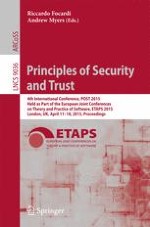2015 | Buch
Principles of Security and Trust
4th International Conference, POST 2015, Held as Part of the European Joint Conferences on Theory and Practice of Software, ETAPS 2015, London, UK, April 11-18, 2015, Proceedings
herausgegeben von: Riccardo Focardi, Andrew Myers
Verlag: Springer Berlin Heidelberg
Buchreihe : Lecture Notes in Computer Science
